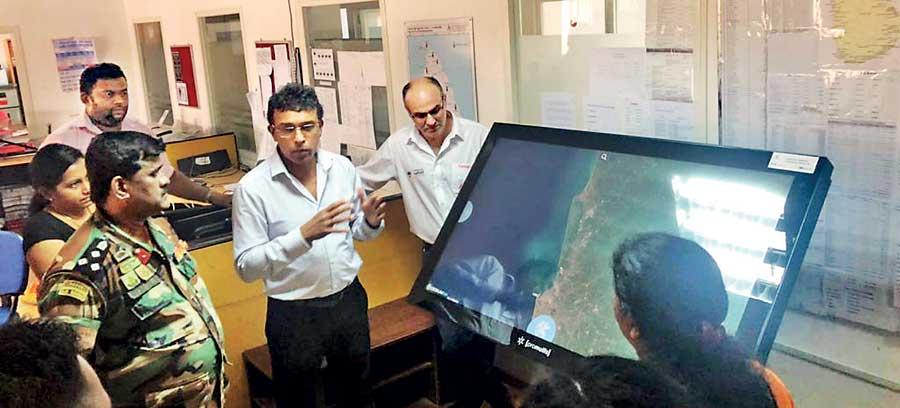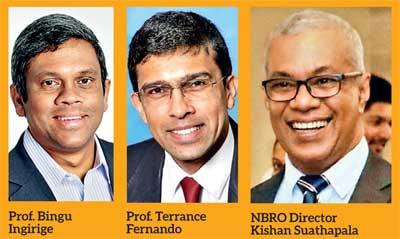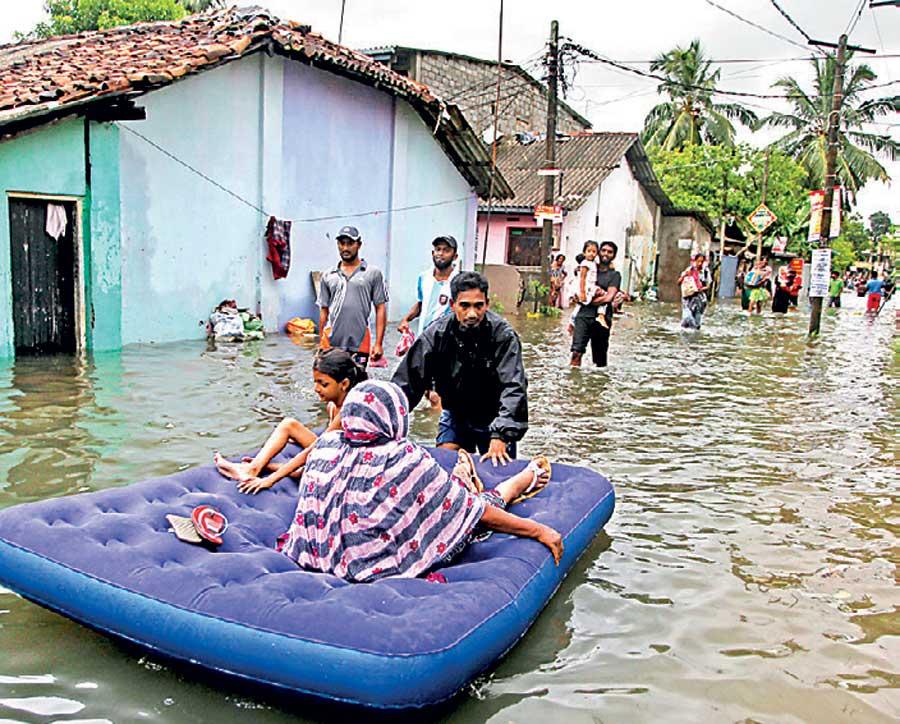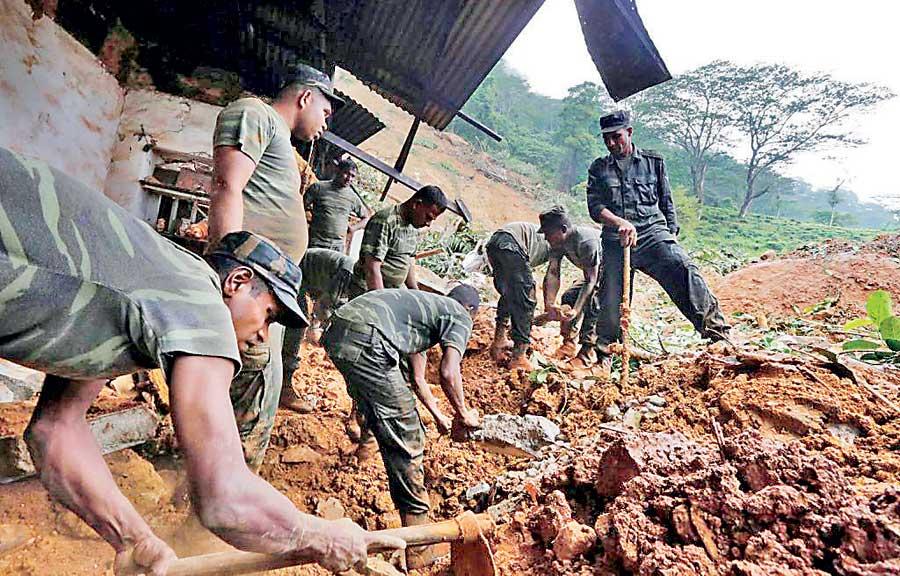Reply To:
Name - Reply Comment
Last Updated : 2024-04-23 12:32:00
International research collaboration between NBRO and THINKlab of UK’s University of Salford

Using state-of-the art touch table Prof. Terrance Fernando explaining how the MOBILISE project works
During a 20 year research, in 2018 Sri Lanka was ranked second in a global index among the most affected countries by extreme weather conditions. The 2019 Long-Term Climate Risk Index, released at the annual climate summit in Poland by Germanwatch, listed the island nation after Puerto Rico, the worst affected country in the world which recorded nearly 3000 deaths due to natural disasters. The Index had analysed as to what extent the countries have been affected by impacts of weather-related catastrophies such as floods, landslides, storms, heat waves from 1998 to 2017.
countries by extreme weather conditions. The 2019 Long-Term Climate Risk Index, released at the annual climate summit in Poland by Germanwatch, listed the island nation after Puerto Rico, the worst affected country in the world which recorded nearly 3000 deaths due to natural disasters. The Index had analysed as to what extent the countries have been affected by impacts of weather-related catastrophies such as floods, landslides, storms, heat waves from 1998 to 2017.
Puerto Rico, Sri Lanka, and Dominica were the most affected countries in 2017 and it revealed that in May 2017, heavy landslides and floods occurred in Sri Lanka after strong monsoon rains in south-western regions of the country, and more than 200 people died after the worst rains on the Indian Ocean island since 2003. The natural disaster that affected 12 out of 25 districts also displaced more than 600,000 people from their homes. The inland southwest district of Ratnapura was most affected, where more than 20,000 people faced flash floods.
Unfortunately the rates of similar natural disasters have been increased significantly over the past decade, placing Sri Lanka one of the worst countries vulnerable to climate change.
"Puerto Rico, Sri Lanka, and Dominica were the most affected countries in 2017 and it revealed that in May 2017, heavy landslides and floods occurred in Sri Lanka after strong monsoon rains in south-western regions of the country, and more than 200 people died after the worst rains on the Indian Ocean island since 2003."
 Amidst such an unfortunate backdrop, there is silver lining with a joint international research project, an effort to protect the Sri Lankan communities facing landslide and other natural disasters using latest high-tech digital technologies and drone technology initiated by the National Building Research Organisation (NBRO). Thanks to the University of Salford’s research with the NBRO that had continued for last five years, the communities have been able to alert on the on-coming natural disasters much earlier than it did few years ago and thereby saving many lives.
Amidst such an unfortunate backdrop, there is silver lining with a joint international research project, an effort to protect the Sri Lankan communities facing landslide and other natural disasters using latest high-tech digital technologies and drone technology initiated by the National Building Research Organisation (NBRO). Thanks to the University of Salford’s research with the NBRO that had continued for last five years, the communities have been able to alert on the on-coming natural disasters much earlier than it did few years ago and thereby saving many lives.
"Thanks to the University of Salford’s research with the NBRO that had continued for last five years, the communities have been able to alert on the on-coming natural disasters much earlier than it did a few years ago and thereby saving many lives."
The NBRO, a research and development institute functioning under the Ministry of Defence in Sri Lanka, is working to minimize landslides and working to build safer environment specially around 12 million population living in the natural disasters-prone areas urban, rural and estate communities. It is also the reputed technical services provider in the fields of geotechnical engineering, landslide risk management, human settlements planning, environmental monitoring, building materials research, and engineering project management.
Working in collaboration with organisations such as the Disaster Management Centre, the leading institutions that come forward whenever a disaster takes place, the Department of Meteorology, the Irrigation Department, the Urban Development Authority (UDA), local authorities, and other originations, the NBRO plays a major role in collecting, sharing visualise data immediately to save people.
According to the NBRO, University of Salford’s research on how a digitally enhanced approach that combines scattered risk information had allowed related organisations to get comprehensive updates of the risks and make decisions on risk communications effectively.

An elderly Sri Lankan woman and a girl are shifted on a mattress at a flooded area in Colombo AP
‘MOBILISE’; digitalising NBRO service
The MOBILISE project (www.mobilise-project.org.uk) is an international research collaboration between the NBRO and THINKlab (www.thinklab.salford.ac.uk) at the University of Salford in UK has been involved in several research initiatives in Sri Lanka in the past and MOBILISE is a joint project between the THINKlab led by Prof. Terrence Fernando and the Centre for Disaster Resilience (CDR) led by Prof. Bingunath Ingirige. It has been an extremely helpful initiative to strengthen the NBRO’s digital capabilities to better respond to disaster risk reduction and disaster response capacities. Officially launched during the NBRO’s annual research symposium 2019, the collaboration has enhanced NBRO’s capacity to deploy advanced IT technology, drones, modelling, simulation and visualisation in disaster risk reduction (DRR) activities in Sri Lanka.
Early Warning System for Landslides via Digitisation
The digitisation of the process of generating early warning messages has been an active collaborative research programme over the last few months. To facilitate this innovative journey, NBRO initially provided access to set of rain gauges to the MOBILISE technical team. This work has now led to the development of a workflow engine to manage the early warning message passing from NBRO to the appropriate authorities. In this novel approach, NBRO district officers, NBRO-EWC, DMC and other stakeholders such as District Secretaries, Divisional Secretaries, NDRSC, GN Officers receives personal login facilities to the EW system. Using the reconfigurable MOBILISE workflow engine, NBRO has the ability to trigger EW massages through the MOBILISE system to responsible officers.
How this is done? Based on the rainfall threshold the automatic rainfall, EW message is generated; the NBRO’s Duty officer then coordinate with the relevant district officers and modify the EW message according to the manual rain gauge network data; the EW message is issued by the Duty officer at NBRO using the MOBILISE platform;
MOBILISE platform then automatically forward the digital EW message to the NBRO’s EW Director for approval; once approved the MOBILISE platform then send the EW message to the Disaster Management Centre; DMC Emergency Operation Centre then has the ability to ask the MOBILISE platform to transmit the message to the appropriate authorities.
"Amidst such an unfortunate backdrop, there is a silver lining with a joint international research project, an efforts to protect the Sri Lankan communities facing landslide and other natural disasters using latest high-tech digital technologies and drone technology initiated by the National Building Research Organisation (NBRO). "
“The detailed information we receive through the digital platform will help us to issue much-needed early warning messages to the local authorities and NGO’s community based organisaion in areas prone to landslide risks. We hope to trial this novel system during the next couple of months” said Kishan Sugathapala, Director of NBRO’s Human Settlements Planning and Training Division.
|
2016 landslide in Kegalle |
“These messages enhance the community preparedness much quicker and we are confident of the messages as the communications have been prepared with the common understanding among the stakeholders. The MOBILISE platform enables us to engage with the communities better as this work is now creating the functionality to send warning information directly to the citizens’ mobiles phones and in the future alarms installed in houses to produce more relevant early warning commutations to mobilising them into risk categories and prepare them for evacuations,” Mr. Sugathapala added.
“Building on the success of our MOBILISE project, the newly funded TRANSCEND Project by the Global Challenges Research Funds in UK has given a new lease of life to our MOBILISE project to take our research to the next level. In this new project, we hope to use the technical platform that we developed during the MOBILISE project to make organizational transformation so that various government organisations and communities can come together to implement urban development project which is equitable and risk-sensitive. We have a strong interdisciplinary academic team, world-leading scientific advisory committee and influential local stakeholder groups to ensure the TRANSCEND project can deliver valuable outputs and outcome. TRANSCEND is a joint project between the THINKlab and the Centre for Disaster Resilience (CDR) led by Prof. Bingunath Ingirige. I am honoured to have the opportunity to work with this world-leading team.” said the Principal investigator of the MOBILISE and the TRANSCEND projects and the THINKlab Director Prof. Terrence Fernando speaking about the collaboration.
“This is the first step towards bringing digital innovation to the current disaster risk reduction and disaster response practices in Sri Lanka. We hope to work closely with the DMC and NBRO team to further enhance the functionality of the MOBILISE platform to ensure the platform is fit for purpose for their DRR and disaster response activities. My hope is that the MOBILISE platform becomes the national platform for DRR and disaster response activities in Sri Lanka and other countries in the region.” said Professor Fernando, a Sri Lankan based in the UK.
The MOBILISE team visited Sri Lanka’s Disaster Management Centre and the NBRO in December 2019 to ensure the smooth handover of the new MOBILISE digital platform for strengthening their disaster risk reduction activities.
During the visit Sri Lanka was donated the MOBILISE platform runs on a high-performance computer and uses a state-of-the-art digital touch table to allow multi-agency teams to work together to explore local risks and implement disaster risk reduction strategies and use as an interactive knowledge base for responding to disasters.
Initiated in May 2017, the MOBILISE project is funded by the UKRI (EPSRC) and Global Challenges Research Fund in the UK.

Sri Lankan military personnel searching for survivors of 2016 landslide at Bulathkohupitiya in Kegalle

Add comment
Comments will be edited (grammar, spelling and slang) and authorized at the discretion of Daily Mirror online. The website also has the right not to publish selected comments.
Reply To:
Name - Reply Comment
On March 26, a couple arriving from Thailand was arrested with 88 live animal
According to villagers from Naula-Moragolla out of 105 families 80 can afford
Is the situation in Sri Lanka so grim that locals harbour hope that they coul
A recent post on social media revealed that three purple-faced langurs near t

21 Apr 2024